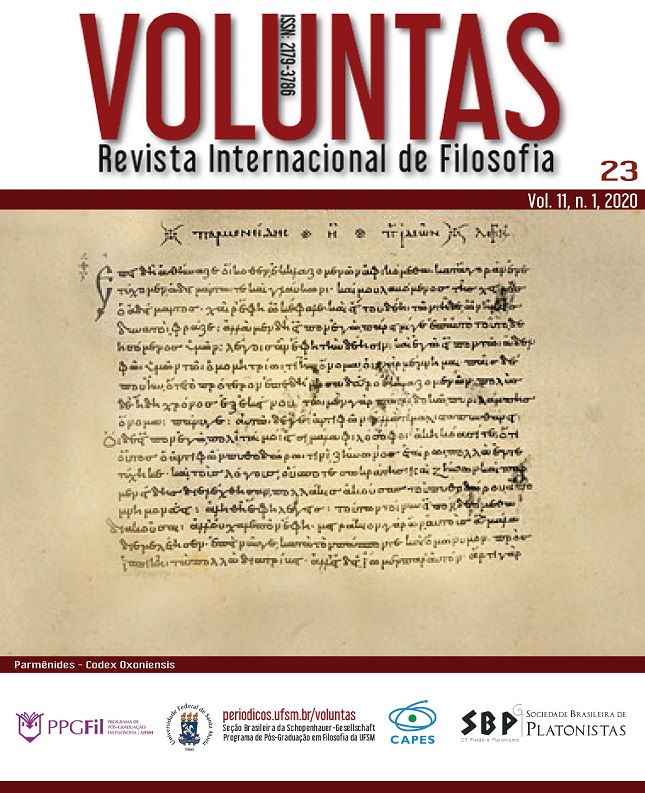O "Parmênides" de Platão revisitado
DOI:
https://doi.org/10.5902/2179378643269Palavras-chave:
Parmênides, Impureza dos sensíveis, Pureza das Formas, Participação, DeduçõesResumo
O Parmênides de Platão é um diálogo notoriamente desafiador. Para apresentar uma interpretação completamente satisfatória dele, cada argumento precisa ser reconstruído em seus próprios termos e se todas as reconstruções forem acuradas, as interconexões lógicas entre os argumentos de ambas as partes do diálogo devem revelar a mensagem geral do Parmênides. Aqui gostaria de resumir minha interpretação e considerar algumas importantes objeções e alternativas a ela, particularmente como estas aparecem nos trabalhos de Constance Meinwald e Mary Louise Gill. Quero explicar por que a interpretação de Meinwald é significativamente menos convincente do que a minha e, como Gill e eu chegamos a conclusões semelhantes, quero destacar as diferenças importantes entre nossas interpretações.Downloads
Referências
GILL, M. L. Philosophos: Plato’s Missing Dialogue. Oxford: Oxford University Press, 2012.
GILL, M. L. Introduction to Plato: Parmenides. Indianapolis/Cambridge: Hackett Publishing Company, 1996, pp. 1-123.
MEINWALD. C. C. Plato’s Parmenides. New York: Oxford University Press, 1991.
MEINWALD. C. C. Good-bye to the Third Man, In: KRAUT, R. (ed.). The Cambridge Companion to Plato. Cambridge: Cambridge University Press, 1992, pp. 365-396.
MEINWALD. C. C. How Does Plato’s Exercise Work?, Dialogue, 53, 2014, pp. 465-494.
PETERSON, S. Plato’s Parmenides: A Principle of Interpretation and Seven Arguments, Journal of the History of Philosophy 34, 1996, pp. 167-192.
PETERSON, S. The Language Game in Plato’s Parmenides, Ancient Philosophy, 20, 2000, pp. 19-51.
PETERSON, S. New Rounds of Exercise in Plato’s Parmenides, Modern Schoolman, 80, 2003, pp. 245-278.
PETERSON, S. The Greatest Difficulty for Plato’s Theory of Forms: The Unknowability Argument of Parmenides 133c-134c, Archiv für Geschichte der Philosophie, 63, 1981, pp. 1-16.
RICKLESS, S. How Parmenides Saved the Theory of Forms, Philosophical Review, 107, 1998, pp. 501-554.
RICKLESS, S. Plato’s Forms in Transition. Cambridge: Cambridge University Press, 2007.
RICKLESS, S. Plato’s Parmenides, The Stanford Encyclopedia of Philosophy (Spring 2016 Edition), Edward N. Zalta (ed.), URL = https://plato.stanford.edu/archives/spr2016/entries/plato-parmenides/
SAYRE, K. Plato’s Late Ontology: A Riddle Resolved. Princeton: Princeton University Press, 1983.
SAYRE, K. Parmenides’ Lesson: Translation and Explication of Plato’s Parmenides. South Bend: University of Notre Dame Press, 1996.
VLASTOS, G. The Third Man Argument in the Parmenides, Philosophical Review, 63, 1954, pp. 319-349.
Publicado
Como Citar
Edição
Seção
Licença
A submissão de originais para este periódico implica na transferência, pelos autores, dos direitos de publicação impressa e digital. Os direitos autorais para os artigos publicados são do autor, com direitos do periódico sobre a primeira publicação. Os autores somente poderão utilizar os mesmos resultados em outras publicações indicando claramente este periódico como o meio da publicação original.
A Voluntas é um periódico de acesso aberto sob a licença Creative Commons Atribuição-NãoComercial-CompartilhaIgual 4.0 Internacional (CC BY-NC-SA 4.0).







